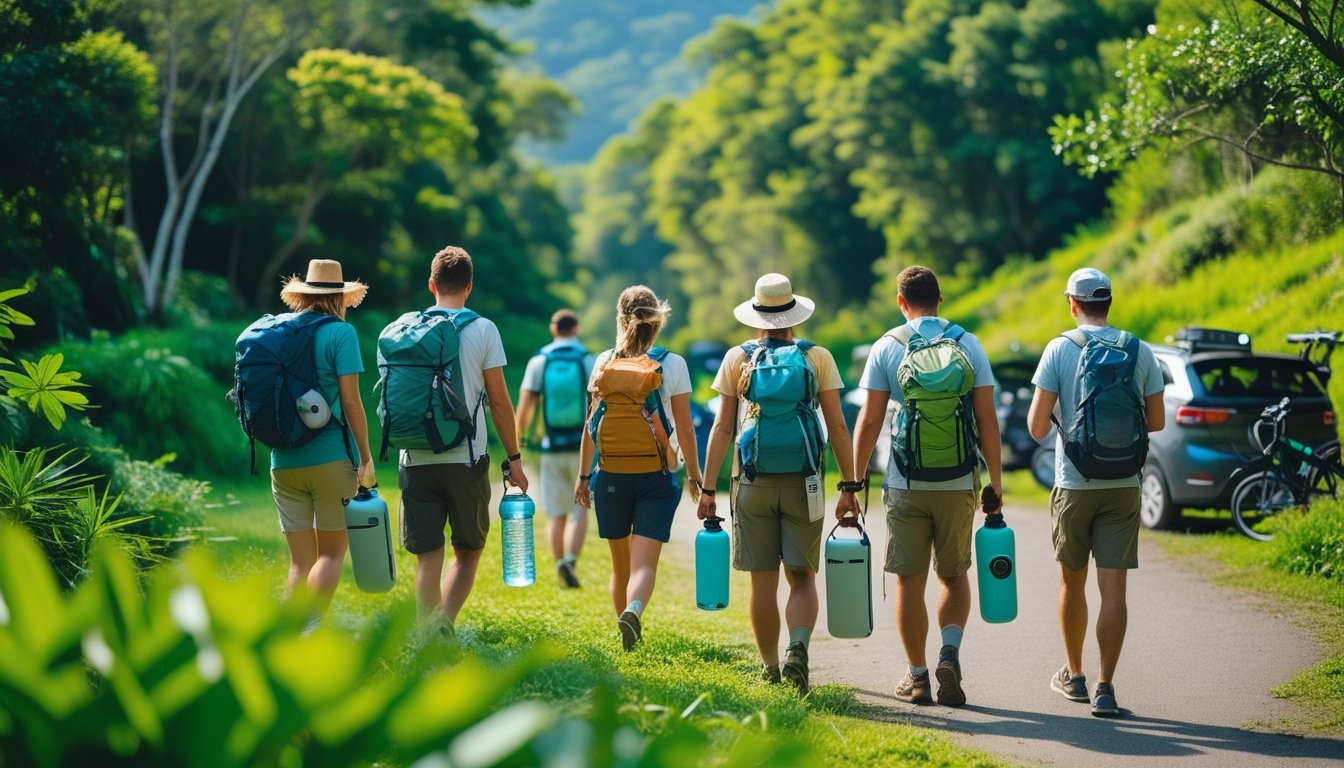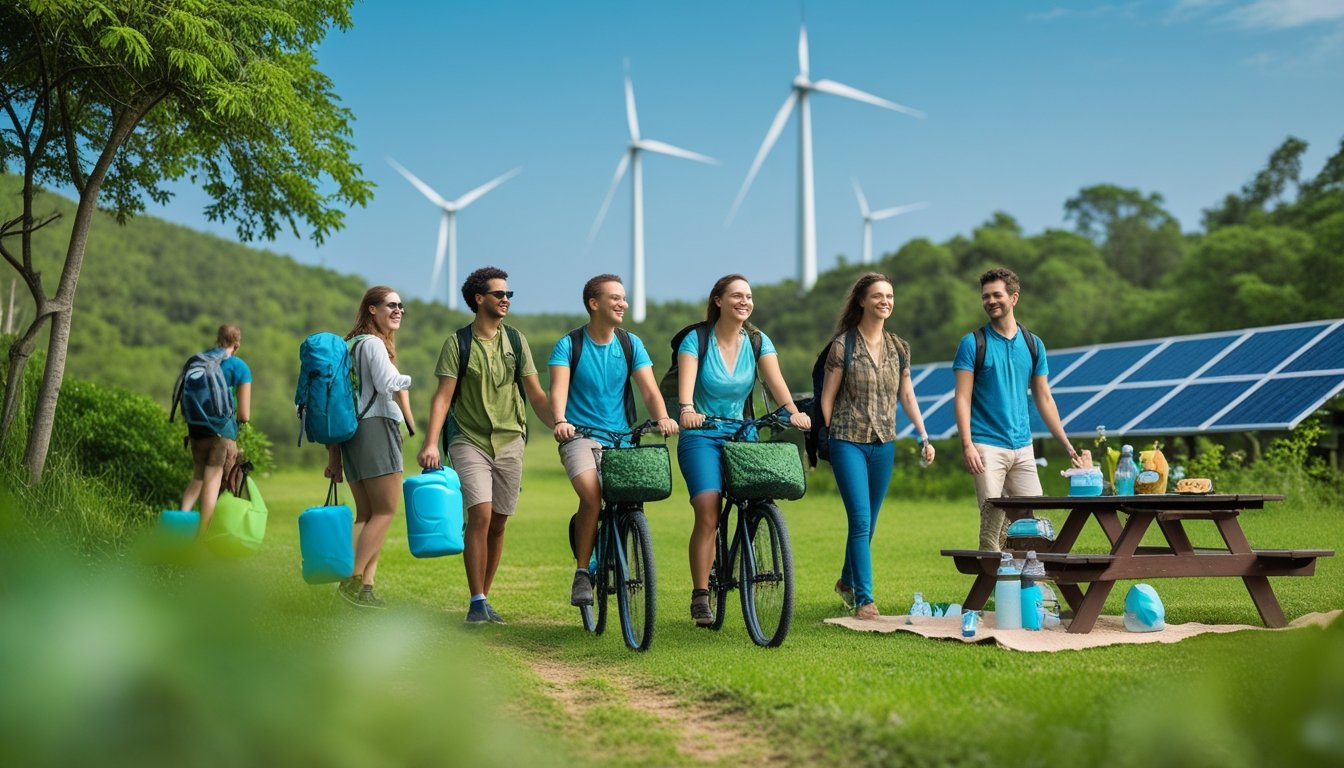Late updated: 05 Sep 2025 08:09
Written by: Sarah Hollister
Eco-Friendly Travel Tips For A Sustainable Holiday: Your Guide To Green Adventures
Travelling during the holidays offers not only new experiences but also a chance to reflect on the effects of our journey on the planet. By integrating sustainability into our travels, we can minimize our ecological footprint and contribute to protecting the very destinations we cherish. From selecting environmentally conscious accommodations to choosing local and seasonal food options, sustainable travel practices are increasingly accessible and impactful.

While the allure of far-off places can be compelling, it is important to consider the environmental cost of our transport choices. Longer stays and fewer flights can significantly reduce our carbon emissions. Embracing eco-friendly practices during our holidays doesn't just benefit the planet; it also enriches our travel experiences by fostering a more genuine connection with the places we visit.
Sustainable travel is more than a trend; it's a responsibility. With a few considered decisions, our holidays can support the wellbeing of nature and culture, allowing us to explore with conscience and joy.
Key Takeaways
- Sustainable travel reduces carbon footprint.
- Eco-friendly practices enhance travel experiences.
- Responsible tourism supports nature and culture.
Fundamental Eco-Friendly Travel Tips
Embracing sustainable travel is essential for reducing carbon emissions and supporting environmental preservation. By considering sustainable transportation, eco-friendly accommodations, and responsible tourism practices, we can minimise our ecological impact while enriching travel experiences.
Prioritising Sustainable Transportation Options
Selecting eco-friendly ways to travel reduces our carbon footprint significantly. Public transportation, cycling, and walking are excellent choices for short distances, as they produce fewer emissions than private vehicles. Trains, known for their energy efficiency, are ideal for longer journeys and generally emit less CO2 compared to flying.
Ridesharing platforms offer another practical alternative, pooling resources and reducing the number of vehicles on the road. For unavoidable flights, supporting carbon offset programs helps mitigate environmental impacts.
Choosing Eco-Friendly Accommodation
When planning a holiday, opting for eco-certified accommodations plays a crucial role in conserving resources. Eco-lodges and eco-certified hotels, such as those certified by Green Key or EarthCheck, prioritise sustainable practices. These include employing renewable energy, implementing energy-efficient lighting, and promoting effective waste reduction strategies.
Using biodegradable soaps and encouraging guests to participate in water conservation efforts are also prevalent practices. We should always check for recycling programs and services that allow us to replenish and refill personal items, avoiding single-use plastics.
Supporting Local Communities and Responsible Tourism
Responsible tourism involves contributing positively to the regions we visit, fostering community support and promoting conservation. Buying locally-sourced food and products supports the local economy and reduces the environmental costs associated with transportation. Exploring wildlife sanctuaries or participating in conservation projects can enrich our travel experiences while aiding environmental initiatives.
Practising a plant-based diet, even temporarily, can dramatically lessen the environmental impact of our meals. By participating in or supporting conservation efforts, we further our commitment to sustainable travel and the protection of cultural heritage.
Advanced Sustainable Holiday Practices

Embracing advanced sustainable holiday practices involves proactive steps to reduce waste, engage with local conservation efforts, and interact responsibly with wildlife. These actions ensure that our travels contribute positively to the environment and communities.
Waste Reduction and Avoiding Single-Use Plastics
Waste reduction is critical to reducing our environmental footprint. Bringing a reusable water bottle allows us to minimise plastic waste and refill when necessary. Using bamboo utensils and carrying reusable items such as cloth bags or cups helps avoid single-use plastics.
Participating in local recycling programmes is also essential. Several destinations offer facilities to recycle plastics and other materials. Additionally, opting for biodegradable soaps and toiletries ensures we do not contribute to pollution. By taking these steps, we can support both local environments and global sustainability goals.
Engaging in Conservation and Clean-Up Activities
Taking part in local conservation projects or beach clean-ups can have a significant positive impact on destinations we visit. Many communities promote environmental initiatives that offer opportunities to assist in preserving natural habitats.
Engaging in responsible tourism not only supports these initiatives but also connects us with the local community. By participating in activities like tree planting or local environmental workshops, we contribute to community support and gain a deeper appreciation for the area.
Ethical Wildlife and Nature Encounters
It's vital to experience nature and wildlife ethically. When interacting with animals or visiting natural sites, we must prioritise wildlife protection and cultural sensitivity. Visiting accredited wildlife sanctuaries ensures that animals are treated well, and by avoiding attractions that exploit animals, we contribute to their well-being.
Supporting communities that focus on conservation further fosters a positive relationship with the local environment. Ethical encounters also mean following guidelines that minimise disturbances to ecosystems. By choosing experiences that respect nature and wildlife, we promote sustainable tourism practices.
Frequently Asked Questions

Travelling sustainably involves making conscious decisions about transportation, accommodation, and activities. We aim to provide clear answers to common questions on eco-friendly travel.
What are the best practices for reducing your carbon footprint while travelling?
Start with simple actions like using reusable water bottles and bags. Avoid flights for short distances when possible, and opt for trains or buses. Supporting local businesses and choosing activities that focus on conservation can also help reduce our environmental impact.
How can you choose accommodations that support sustainable travel?
Look for lodgings that prioritise environmental practices, such as energy and water conservation, waste reduction, and the use of renewable resources. Eco-friendly hotels often hold certifications from reputable organisations that verify these practices.
What means of transport is the most environmentally friendly for overseas trips?
When travelling overseas, flying is often unavoidable, but we can choose airlines that are committed to reducing their carbon emissions. Direct flights are generally more efficient, and certain classes may offer a lower carbon footprint.
Which destinations are known for their commitment to eco-friendly tourism?
Countries like Costa Rica, Norway, and Bhutan are renowned for their environmental efforts. These nations invest in preserving natural habitats and encourage visitors to engage with ecosystems responsibly.
Which travel companies are recognised for their eco-friendly policies and practices?
Some companies make significant strides in sustainability. Look for those that offset their carbon emissions, use eco-friendly materials, and support local conservation efforts. Certification by organisations like the Global Sustainable Tourism Council can be a good indicator.
How can you offset the environmental impact of your travels effectively?
Offsetting our carbon emissions involves investing in projects that reduce greenhouse gases, such as reforestation efforts or renewable energy initiatives. Many organisations offer ways to calculate and offset the carbon produced by our travels, allowing us to contribute positively.
